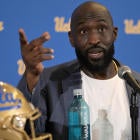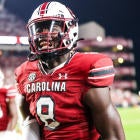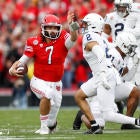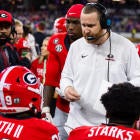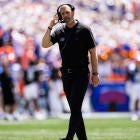
CBS Sports revealed the first half of its 2024 coach rankings Tuesday, leaving one group of program leaders with the dubious distinction of bottom 10. That list includes three of the four first-time coaches, as expected. It also features familiar names like former Clemson offensive coordinator Tony Elliott and longtime coach Scott Satterfield.
Colorado coach Deion Sanders is the biggest name by far in the bottom 10 after an encouraging 3-0 start with the Buffs careened into a 1-8 conference slate. He actually moved down from his 2023 debut at No. 55. Purdue coach Ryan Walters also moved down from his debut slot, while Vanderbilt's Clark Lea backslid seven spots back into the bottom 10.
Out of the bottom 10 coaches in the 2023 rankings, three are no longer with their programs: Zach Arnett (fired), Tom Allen (fired) and Jeff Hafley (left for an NFL assistant job). Four coaches remain in the group: Troy Taylor, Ryan Walters, Kenny Dillingham and Tony Elliott.
Every coach on this list should look no further than Jedd Fisch for inspiration. Fisch led Arizona to a 10-win season and jumped 30 spots in the rankings. With so many new coaches on the board, a major leap is absolutely possible. Here's how we evaluate each bottom 10 coach's chances of rising in 2025.
68. DeShaun Foster, UCLA
Resume: UCLA RBs coach, former All-American RB
Foster was easily the least credentialed new hire by a power conference school this cycle, but there's context. UCLA was forced into a coaching search late in the cycle after Chip Kelly surprisingly left to take over as offensive coordinator at Ohio State. Foster has a deep history with the program, dating back to a 2001 All-American season with 1,109 yards rushing in just eight games.
How he can rise: There's no secret that Foster's primary responsibility will be presiding over UCLA's jump into the Big Ten. Foster has a solid football rep but was also hired to rebuild a strong off-field football operation with his vocal and emotional leadership. Perhaps the greatest point for optimism for Foster's tenure is the staff he put together. Longtime NFL assistant and head coaching candidate Eric Bienemy will call the offense, with ex-NFL staff member Juan Castillo coaching the offensive line. Several standout assistants return from Kelly's staff, including Ikaika Malloe taking over as defensive coordinator. That said, the task in front of Foster is immense; it would not be a surprise to see him near the bottom next year too.
67. Fran Brown, Syracuse
Resume: Georgia DBs coach, Temple co-DC, Baylor assistant head coach
Brown's hire marked another rare jump from position coach to head coach, but he learned from some of the best in the industry. The former NFL corner served under Matt Rhule (Temple and Baylor) and Greg Schiano (Rutgers) before landing on Kirby Smart's Georgia staff. He is considered perhaps the best recruiter in the Northeastern region.
How he can rise: Brown has emerged as one of the fiercest recruiters in college football and has also produced a few major wins in his short tenure. The Orange jumped from No. 73 to 36 in the 247Sports overall recruiting rankings after reeling in a top 25 transfer class, headlined by Ohio State quarterback Kyle McCord. Frankly, Brown is well on track to shoot up the rankings if his roster lives up to some of its high promise.
66. Jeff Lebby, Mississippi State
Resume: Oklahoma OC, Ole Miss OC, UCF OC
Other than promoted Michigan assistant Sherrone Moore, Lebby is the highest-ranked of the first-time coaches in the Power Four. Lebby adheres to the old Baylor system that he learned under his father-in-law, Art Briles. He implemented versions of it under Josh Heupel at Tennessee, Lane Kiffin at Ole Miss and finally on his own at Oklahoma.
How he can rise: After the failed Zach Arnett era, Mississippi State is starving for offense. Lebby built one of the most productive in college football over the past several years at Oklahoma. The Sooners finished No. 3 in total offense last season. Injecting some life into the Bulldogs and scoring against the best programs in the sport would make him a fast riser.
65. Ryan Walters, Purdue
Record: 4-8 (all at Purdue)
There's plenty of context to Walters' first-year struggles, but the results still weren't great. Purdue fell to 4-8 in 2023 after 17 wins and an appearance in the Big Ten title game over the previous two years. Losses to Fresno State and Syracuse in the first three weeks set the tone and the Boilermakers struggled to regain their footing. Prior to Purdue, Walters was a respected defensive coordinator at Illinois and Purdue.
How he can rise: Under prior coach Jeff Brohm, the Boilermakers built an identity of dynamic passing and quarterback development. The first year of the Walters era, conversely, was largely devoid of any real definition. Graham Harrell brought an Air Raid offense, but highly-touted QB transfer Hudson Card completed fewer than 60% of his passes. Walters' signature defense was last in points allowed in the Big Ten despite playing a putrid group of offenses in the Big Ten West. Finding a direction will be perhaps the most pressing issue facing Walters.
64. Kenny Dillingham, Arizona State
Record: 3-9 (all at Arizona State)
Dillingham's first year was a mess, but there were some reasonable explanations. The program was gutted after previous coach Herm Edwards left amid scandal and pending NCAA sanctions. The Sun Devils also suffered a string injuries at the quarterback position and were even forced to play some true Wildcat. ASU might face some of the same issues in 2024, especially after losing quarterback Jaden Rashada to the transfer portal,
How he can rise: Dillingham is an offensive whiz, but his offense was largely devoid of consistent talent thanks to injuries and a few misses. While quarterback remains up in the air after adding transfers Sam Leavitt and Jeff Sims, a stacked running back room gives him something to work with. The Sun Devils are still firmly in the middle of a rebuild and turning over nearly 50 scholarship slots in 2024. More than anything, Dillingham needs to lean into his background and create a legitimately creative, scary offense. Wins can come later, but production must come now.
63. Clark Lea, Vanderbilt
Record: 9-27 (all at Vanderbilt)
Lea earned some praise after a 5-7 2022 campaign that included two SEC wins. That optimism flew out the door in 2023 as the Commodores dropped their final 10 contests and lost every conference game by at least 16 points. A 16-point loss to Wake Forest might be the worst blemish on the list. Vandy made some shrewd moves over the offseason, headlined by bringing on much of the New Mexico State braintrust that shockingly won 10 games and upset Auburn. Former coach Jerry Kill, offensive coordinator Tim Beck and quarterback Diego Pavia lead the movement.
How he can rise: Vanderbilt is heavily disadvantaged in the SEC, so no one is expecting consistent winning records in conference play. That said, losing to Wake Forest and UNLV in Year 3 is a disaster. Add those losses to a docket that also features East Tennessee State and Stanford in 2021 and things look gnarly. Lea remains perhaps the ideal on-paper coach for Vanderbilt football. He played fullback for the Commodores next to Jay Cutler and coached at private schools Wake Forest and Notre Dame. Lea has done a strong job fundraising and getting Vanderbilt to SEC-level facilities. Eventually, though, you have to win.
62. Tony Elliott, Virginia
Resume: 6-16 (all at Virginia)
Elliott's first year was largely erased after the killing of three players in a senseless act of gun violence. Year 2 brought plenty of lows on the football field during a 3-9 campaign. While five one-score losses provide some optimism, the Cavs have put together almost zero consistency over the past two seasons. Both the scoring offense and defense ranked bottom-three in the ACC.
How he can rise: Generally speaking, the Cavaliers were just better when dynamic freshman quarterback Anthony Colandrea was in the lineup, even though his antics cost them a potential win against NC State. Colandrea averaged 278 yards per game in seven starts and limited himself to three interceptions with eight touchdowns in his final four. Elliott should work through the growing pains with Colandrea, who could eventually become an ACC star.
61. Deion Sanders, Colorado
Record: 31-14 (4-8 at Colorado)
Sanders' ranking was hotly contested, with voters ranging all over the map on "Coach Prime." In full transparency, I had Sanders a few spots higher than he landed due to his 23-3 record in non-pandemic seasons at Jackson State. While his 4-8 record in Year 1 was perfectly reasonable, Year 2 comes with real expectations after adding 52 new players -- and counting -- to complement Shedeur Sanders and Travis Hunter in their final season.
How he can rise: Sanders' insistence on rebuilding rosters from scratch through the transfer portal is a blessing and curse. On the bright side, he has emerged as one of the best talent acquirers for his level in college football. That also brings major expectations, and it's unclear whether Colorado's roster can cash the checks the program has written itself. Getting to a bowl game should move Sanders significantly up the list, but reaching the top 40 will take more than eight wins.
60. Troy Taylor, Stanford
Record: 33-17 (3-9 at Stanford)
Taylor took a winding road to power conference football that included a spot New York Jets roster, color commentary and multiple years as a head football coach in Folsom, California. Ultimately, three straight top-10 finishes at FCS Sacramento State earned him a shot to replace the legendary David Shaw at Stanford. The first season featured plenty of flaws, but there are reasons for optimism.
How he can rise: Taylor already rose nine spots after showing promise during a 3-9 debut season. Stanford played Washington and Arizona within 10 points and were unlucky enough to ironically play Taylor's former Sac State squad in a revenge game. Elic Ayomanor is the best wide receiver in the nation that no one is talking about. Most exciting, Taylor strung together a top-30 recruiting class. Wins have to come, but Taylor is heading in the right direction.
59. Scott Satterfield, Cincinnati
Record: 79-57 (3-9 at Cincinnati)
Satterfield led App State to one of the most successful transitions ever when the Mountaineers moved from FCS to the Sun Belt. One season into his job at Cincinnati, the Bearcats haven't taken any of the same steps. The transition was always going to be difficult after Luke Fickell left for Wisconsin, but almost every unit ranked among the worst in the Big 12 in his first year. Making matters worse, Louisville (Satterfield's former job) earned a trip to the ACC title game.
How he can rise: Satterfield is the only veteran FBS coach on our list, making his path far more complicated. At the power conference level, he holds just a 28-33 record and has not finished above .500 in conference play since his first year at Louisville. Really, Satterfield simply needs to show any indicators of a healthy, growing program in Year 2, whether that's building an identity, picking up recruiting wins or finding a few young stars. Running back Corey Kiner and defensive tackle Dontay Corleone are a solid start, but Satterfield inherited both players.












